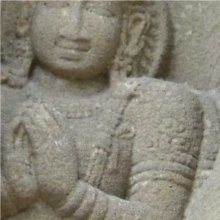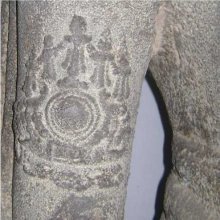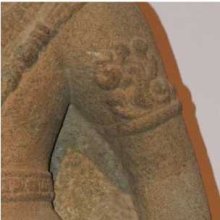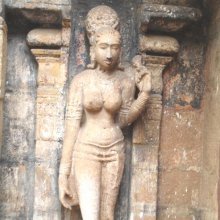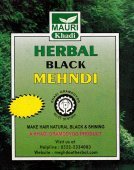More, Morce: 2 definitions
Introduction:
More means something in biology. If you want to know the exact meaning, history, etymology or English translation of this term then check out the descriptions on this page. Add your comment or reference to a book if you want to contribute to this summary article.
Images (photo gallery)
(+531 more images available)
Biology (plants and animals)
Source: Google Books: CRC World Dictionary (Regional names)1) More in Guinea-Bissau is the name of a plant defined with Stereospermum kunthianum in various botanical sources. This page contains potential references in Ayurveda, modern medicine, and other folk traditions or local practices.
2) More in Mexico is also identified with Solanum nigrum It has the synonym Solanum nigrum var. atriplicifolium G. Meyer (etc.).
Example references for further research on medicinal uses or toxicity (see latin names for full list):
· Proceedings of the Indian Science Congress Association (1983)
· Linnaea (1832)
· Indian Journal of Genetics and Plant Breeding (1980)
· Flora Brasiliensis (1846)
· Cytologia (1989)
· Bulletin of Botanical Research (1994)
If you are looking for specific details regarding More, for example health benefits, chemical composition, side effects, extract dosage, pregnancy safety, diet and recipes, have a look at these references.

This sections includes definitions from the five kingdoms of living things: Animals, Plants, Fungi, Protists and Monera. It will include both the official binomial nomenclature (scientific names usually in Latin) as well as regional spellings and variants.
Languages of India and abroad
Kannada-English dictionary
Source: Alar: Kannada-English corpusMore (ಮೊರೆ):—
1) [verb] (a bee) to make a low, continuous, murmuring sound; to hum.
2) [verb] to make a harsh, shrill, grating or squeaking sound, as rusted hinges; to creak.
3) [verb] to make a sound (as a musical instrument).
--- OR ---
More (ಮೊರೆ):—
1) [verb] to make a continuous, rumbling sound; to roar.
2) [verb] to make a sound like that of a prolonged s, as of a goose or snake when provoked or alarmed or of escaping steam, air, etc.; to hiss.
3) [verb] to utter along, shrill sound as from pain.
4) [verb] to become very angry, wrathful.
--- OR ---
More (ಮೊರೆ):—[noun] the humming sound of a bee.
--- OR ---
More (ಮೊರೆ):—
1) [noun] a long, pitiful cry of grief and pain or a sound like this; wail.
2) [noun] the act of complaining; utterance of pain, displeasure, annoyance, etc.; a complaint.
3) [noun] the manner, way in which something is done, to be done.
4) [noun] a limit either physical or regulative, within which one or one’s acts must confine.
5) [noun] connection of persons by blood, marriage, etc.; kinship; relation.
6) [noun] a person so related.
7) [noun] good behaviour.
--- OR ---
More (ಮೊರೆ):—
1) [noun] the state of being not aware of one’s own existence, sensations, thoughts, surroundings, etc; unconciousness.
2) [noun] an instance of going out of sight; disappearance.
3) [noun] that which is deliberately kept from another’s or other knowledge; a secret.
4) [noun] a secret place.
5) [noun] that which is behind; background.
6) [noun] the part lying within; inside; interior.
7) [noun] that which covers or with which something is covered; a cover; a veil; a screen.
8) [noun] a protective cover for the body, worn by a soldier; an armour.
9) [noun] anything used to get or give protection; a guard.
10) [noun] any clothes, equipment used for disguising; a disguise.
11) [noun] a place of protection; a shelter; a refuge.
12) [noun] that which hinders, obstructs.
13) [noun] an instance deceiving; deception.
14) [noun] (fig.) the divine illusion that prevents ordinary people from knowing the truth.
15) [noun] the fact of being protecting; protection.
--- OR ---
Moṟe (ಮೊಱೆ):—
1) [verb] to make a continuous, rumbling sound; to roar.
2) [verb] to make a sound like that of a prolonged s, as of a goose or snake when provoked or alarmed or of escaping steam, air, etc.; to hiss.
3) [verb] to utter along, shrill sound as from pain.
4) [verb] to become very angry, wrathful.
--- OR ---
Moṟe (ಮೊಱೆ):—
1) [noun] a long, pitiful cry of grief and pain or a sound like this; wail.
2) [noun] the act of complaining; utterance of pain, displeasure, annoyance, etc.; a complaint.
3) [noun] the manner, way in which something is done, to be done.
4) [noun] a limit either physical or regulative, within which one or one’s acts must confine.
5) [noun] connection of persons by blood, marriage, etc.; kinship; relation.
6) [noun] a person so related.
7) [noun] good behaviour.
--- OR ---
Moṟe (ಮೊಱೆ):—
1) [noun] the state of being not aware of one’s own existence, sensations, thoughts, surroundings, etc; unconciousness.
2) [noun] an instance of going out of sight; disappearance.
3) [noun] that which is deliberately kept from another’s or other knowledge; a secret.
4) [noun] a secret place.
5) [noun] that which is behind; background.
6) [noun] the part lying within; inside; interior.
7) [noun] that which covers or with which something is covered; a cover; a veil; a screen.
8) [noun] a protective cover for the body, worn by a soldier; an armour.
9) [noun] anything used to get or give protection; a guard.
10) [noun] any clothes, equipment used for disguising; a disguise.
11) [noun] a place of protection; a shelter; a refuge.
12) [noun] that which hinders, obstructs.
13) [noun] an instance deceiving; deception.
14) [noun] (fig.) the divine illusion that prevents ordinary people from knowing the truth.
15) [noun] the fact of being protecting; protection.
--- OR ---
Mōre (ಮೋರೆ):—
1) [noun] the front of the head from the top of the forehead to the bottom of the chin, and from ear to ear; visage; the face.
2) [noun] the area or region which something is facing.
3) [noun] ಮೋರೆ ಕಂಡರೆ ಮನಸ್ಸು ತಿಳಿದೀತೆ [more kamdare manassu tilidite]? mōre kaṇḍare manassu tiḷidīte (prov.) the face is not the true index of the mind.
--- OR ---
Mōrce (ಮೋರ್ಚೆ):—
1) [noun] a platform on the bastion that gives a wider range for a firing artilleries.
2) [noun] a military attack.
3) [noun] a strategic place on a fort for soldiers to stand.
--- OR ---
Mōṟe (ಮೋಱೆ):—
1) [noun] the front of the head from the top of the forehead to the bottom of the chin, and from ear to ear; visage; the face.
2) [noun] the area or region which something is facing.
Kannada is a Dravidian language (as opposed to the Indo-European language family) mainly spoken in the southwestern region of India.
See also (Relevant definitions)
Starts with (+29): Morcekattu, More gida, More o moseltha, Moredappu, Moregedi, Moregedu, Moregey, Moregidisu, Moregidu, Moregodu, Moregol, Moreh-khujang-lei, Moreh-tera, Morehogu, Moreira, Morejvara, Morekara, Morekhure, Morekure, Morekuri.
Ends with (+26): Addamore, Agadumore, Alumore, American sycamore, Arizona sycamore, Aymore, California sycamore, Chalmore, Eastern sycamore, Egyptian sycamore, False sycomore, Gayimore, Germinating Once More, Halamore, Halmore, Halumore, Henamore, Hyapumore, Ilimore, Imore.
Full-text (+7604): Uttarottara, Adhika, Pragunya, Adhikadhika, Abhyadhika, Samadhika, Anekartha, Smritivirodha, Parahshata, Parahsahasra, Taratamya, Lokacara, Kshinapunya, Aneka, Ekapaladhika, Shatadhika, Athakimu, Varatara, Sutaram, Dvyadhika.
Relevant text
Search found 551 books and stories containing More, Morce, Mōrce, Moṟe, Mōre, Mōṟe; (plurals include: Mores, Morces, Mōrces, Moṟes, Mōres, Mōṟes). You can also click to the full overview containing English textual excerpts. Below are direct links for the most relevant articles:
The limits of happiness < [January – March, 1990]
The Poetry of Bhatnagar < [January – March, 1983]
War and Literature < [March 1943]
Heimskringla (by Snorri Sturlson)
Part 40 - Eirik And Hakon Make A War Levy < [Chapter VI - King Olaf Trygvason's Saga]
Part 10 - Battle At Solskel < [Chapter III - Harald Harfager's Saga]
Part 2 - King Hakon's Progress Through The Country < [Chapter IV - Hakon The Good's Saga]
Animal Kingdom (Tiryak) in Epics (by Saranya P.S)
Satirical works of Kshemendra (study) (by Arpana Devi)
3. Types of Values < [Chapter 5 - Kṣemendra’s objectives of Satire]
1-2. Concept and Definition of Values < [Chapter 5 - Kṣemendra’s objectives of Satire]
7. Prominent Satirical Works in Sanskrit < [Chapter 1 - Introduction]
The Dawn of the Dhamma (by Sucitto Bhikkhu)
Chapter 1 - The Great Wheel Of The Law < [The Sutta]
Chapter 22 - The World Of Dhamma < [The Sutta]
Chapter 19 - The Abodes Of Bliss < [The Sutta]
Elephantology and its Ancient Sanskrit Sources (by Geetha N.)
Related products
(+140 more products available)

